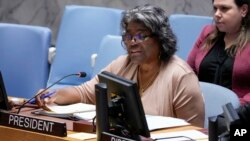In early 2020, the government of the Democratic People’s Republic of Korea, or DPRK, locked down the country’s borders to prevent the spread of the COVID-19 virus. That lock-down continues today. Indeed, “rarely has the DPRK been more painfully closed to the outside world than it is today,” said Volker Türk, UN High Commissioner for Human Rights. “Increasing repression of the rights to freedoms of expression, privacy and movement; the persistence of widespread forced labor practices; and a worsening situation for economic and social rights, due to the closure of markets and other forms of income generation,” has caused human suffering of [enormous] scale and magnitude.
Nearly a decade ago, a United Nations Commission of Inquiry issued a landmark report “which found the DPRK government had committed: ‘systematic, widespread, and gross human rights violations,’ and that in many instances, the violations entailed crimes against humanity,” said United States Representative to the United Nations, Linda Thomas-Greenfield. The situation has not improved since then, she said:
“Reports indicate the DPRK continues to hold more than 80,000 individuals in political prison camps – where, according to reports, they are widely subjected to arbitrary or summary executions, torture, starvation, gender-based violence, forced abortions, and forced labor.”
Furthermore, “The DPRK government has also engaged in acts of transnational repression against its own citizens and foreign nationals,” said Ambassador Thomas-Greenfield:
“The DPRK’s activities abroad have included assassination, surveillance, intimidation, abduction, and forced repatriation. Sometimes with the assistance of other governments. And sometimes without the consent of other governments, which shows the DPRK’s lack of respect for state sovereignty.”
“Kim Jong Un’s repressive, totalitarian control of society – and the systemic, widespread denial of human rights and fundamental freedoms – ensures the regime can expend inordinate public resources developing its unlawful WMD and ballistic missile programs, without public objection,” said Ambassador Thomas-Greenfield. This war machine … is powered by repression and cruelty.”
“Make no mistake: the regime neglects the well-being of people in the DPRK. Its food distribution policies favor the military, and lead to chronic malnourishment among its citizens,” she said.
“The modern world has no place for the DPRK government’s brutality,” said Ambassador Thomas-Greenfield. “The international community … must continue to speak out against this injustice and its destabilizing impact on regional and international peace and security.
“The United States … will continue to promote human rights and fundamental freedoms at home and around the world.”






